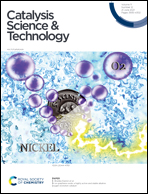Carbon nanofiber supported Ni–ZnO catalyst for efficient and selective hydrogenation of pyrolysis gasoline†
Abstract
Exploration of environmentally benign and efficient non-noble metallic catalysts is important for pyrolysis gasoline (PyGas) hydrogenation in the petrochemical industry. In this study, a series of Ni–ZnO/carbon nanofiber (Ni–ZnO/C) catalysts were synthesized via electrospinning of Ni-doped Zn-metal–organic framework (MOF-5) precursors with polyacrylonitrile, followed by carbonization and reduction treatment. A mixture of isoprene, styrene, n-heptane and thiophene was used as a model feed of PyGas. The Ni–ZnO/C catalysts could be used directly for the hydrogenation of the model feed of PyGas without any passivation and exhibited better activity, selectivity, and stability than the commercial Ni/Al2O3 catalyst. The improvement of Ni–ZnO/C performance may be attributed to the small particle size and the uniform particle size distribution of both Ni species and ZnO species caused by the unique preparation method and the special function of ZnO, thereby separating the Ni species and reducing the acidity and the acid concentration of the catalyst surface.



 Please wait while we load your content...
Please wait while we load your content...